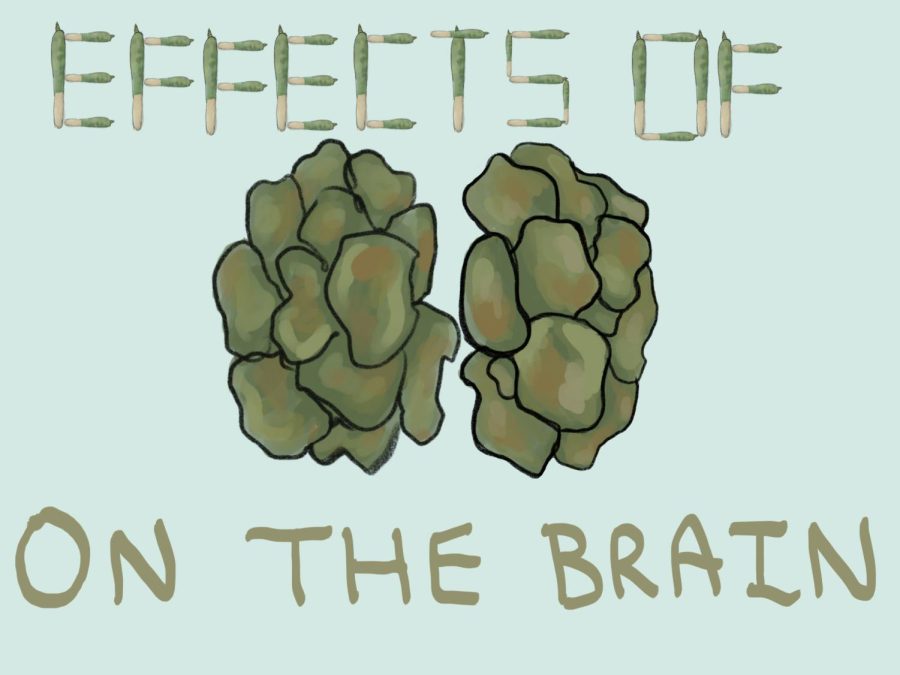The Effects of Weed on the Brain
Contrary to what some believe, marajuana can greatly negatively impact the brain.
Weed can prevent the necessary development of the brain and destroy your body
According to GoodRx, Cannabis is the most widely used illicit drug in the U.S., making it no surprise that many young people use it. A survey in 2020 found that 11.4% of 8th graders had used cannabis in the past year, and 6.5% had used it in the past month, 28% of 10th graders had used cannabis in the past year, and 16.6% had used it in the past month. 35.2% of 12th graders had used cannabis in the past year, and 21.1% had used it in the past month. A study found that, despite weed’s dangers, the number of people who view marajuana as risky has declined, an unsettling fact.
Despite what some people now think, regular usage of weed can greatly negatively impact the brain and body, especially when used in youth. What is considered “regular” usage varies from person to person, sometimes being once a day, but from what I can gather it is generally considered to be about once a week.
Marijuana is particularly bad for the teenage brain, for “the drug may impair thinking, memory, and learning functions and affect how the brain builds connections between the areas necessary for these functions.” Studies are still trying to figure out how permanent these effects are. According to WebMD, “a younger person’s brain can be more vulnerable to adverse long-term effects from THC, which is the primary active ingredient in marijuana. Studies have indicated that adults who smoked marijuana regularly during adolescence have fewer neural fibers in specific brain regions. This can disrupt the brain development process.”
In a study that contrasted people who started using cannabis before age 16, people who started using cannabis after age 16, and people who didn’t use cannabis, the early-using group made more mistakes on tests.
The most well-known study conducted is the Dunedin Study. This study followed a group of over 1,000 people from birth to age 38, and researchers tested the group at age 13, before any of them had started using cannabis, and once again at 38, after some of them smoked it for many years.
The study discovered that people who started using weed in their teens and used heavily into adulthood lost an average of 8 IQ points between the ages of 13 and 38 (those who started using heavily as adults didn’t lose any IQ points). These declines in IQ were not fully reversed even after participants stopped smoking. People around the participants also reported that they had noticeable difficulties with attention and memory. However, some people wonder if the discrepancy between the average income of the common user and the non-user has something to do with it.
According to article “How Does Long-Term Marijuana Use Affect the Brain?”, studies conducted on animals found that “THC exposure during adolescence affected the development of neural networks in the prefrontal cortex and hippocampus and led to long-lasting problems with cognitive abilities.” The prefrontal cortex is involved with numerous necessary and important functions, such as attention, decision-making, and impulse control. The hippocampus plays a role in learning and memory.
According to DrugAbuse.gov, all the use patterns were associated with more recent psychological visits and lifetime psychiatric problems by age 50.
In short, marajuana can and clearly does cause a decrease in IQ, it incites memory problems, lowers dopamine production, and can cause anxiety and depression, according to AmericanAddictionCenters.org. The article you’re currently reading doesn’t even begin to touch on what weed does to the body, which is to say negative– weed both weakens your heart and lungs and is linked to certain types of cancer and can cause strokes.
But what’s perhaps even scarier than the known effects are the unknown effects. There are chemicals in weed that aren’t regulated, and thus chemicals that could greatly negatively impact the brain and the body.
Considering both the known and unknown effects of marijuana, students should think twice before abusing it. Is damaging your brain and body really worth it?




